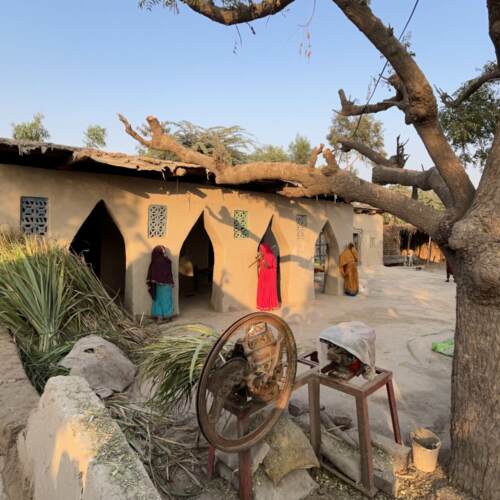Field research in Pono village, Pakistan
Project leaders: Andrea Rieger-Jandl, Christine Lechner, Yasmeen Lari, Zeeshan Asim, Syeda Komal Fatima, Zeaghum Ali
Team: Karolin Wagner, Magdalena Weiermann, Maximilian Flassak, Sibylla Windisch, Moira Ruppert, Melissa Stöhr, Birgit Rieder, Elena Thöni, Patrick Kotschanderle, Fanni Florian, Amna Zahid, Arrej Tahir, Ali Shehroz, Rabia Ishaq, Hassan Khan, Zufeen Haider, Irtaza Malik, Ali Osaf, Uzair Imtiaz
Partners: University of Lahore, Pakistan Heritage Foundation, TU Wien, Spiritual Cords, Gate of Hope Foundation
Type of Project: Field Research
Duration: 29th Nov. – 8th Dec. 2022
Downloads:
Feldstudie
Field report
This field research was held upon the invitation of the Heritage Foundation of Pakistan and its representative, Yasmeen Lari. Yasmeen Lari has lounged an initiative for the reconstruction process of Pono village and 13 other villages in the surrounding after the flood disaster in summer 2022, based on a housing program that had already been going on for years. The project has the potential to have an impact on a large scale and change the quality of housing for a great number of people.
The delegations of Vienna University of Technology and University of Lahore have been the first to visit some villages based on an initiative by Yasmeen Lari called “Climate Volunteers”.
In the course of Yasmeen Lari’s guest professorship in the winter semester 2022 at TU Wien, students from TU Wien and the University of Lahore visited several Pakistani villages directly affected by recent flood disasters. They explored issues of cultural heritage, traditional architectural forms, local earthen construction techniques, empirical field research methods, and resilient self-construction techniques, among other topics. For the first time, students from the Vienna University of Technology surveyed one of the affected villages, Pono Village, they documented buildings and conducted interviews with residents. Furthermore, the solutions for reconstruction implemented by Yasmeen Lari were critically examined and reinterpreted. Particular emphasis was placed on using less lime but mainly CO2-neutral earthen materials.
Since we visited Pono village for a few days only, many questions have been answered but even more have been raised which could not be answered due to the shortage of time. Therefore, our research findings need to be verified, discussed or be subject to further research.
Based on the efforts of the Heritage Foundation of Pakistan we started a first process to evaluate the initiative and explore ways to enhance and optimize it. More research needs to be implemented to form a profound base for the decision-making process.
Read the report for further information.
Figures:
Survey village layout: Elena Thöni, Birgit Rieder, Ali Osaf, Irtaza Malik, Uzair Imtaiz
Survey of traditional houses: Sibylla Helena Windisch and Maximilian Flassak
Fotos: Andrea Rieger-Jandl
.


